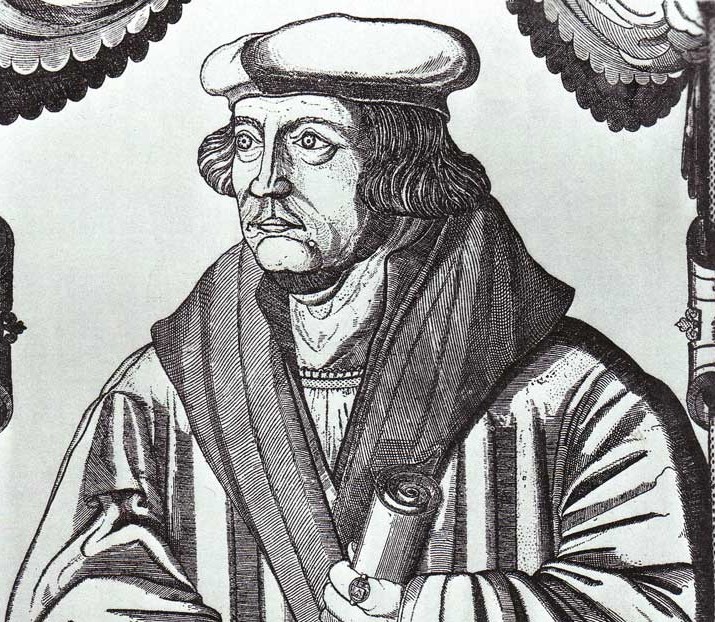As professor at Ingolstadt in Bavaria during the outbreak of the Reformation, John Eck would play a significant role in opposing Luther’s reform and winning Bavaria for the Catholic party. Born Johann Maier in the Swabian village of Eck, he would go on to study at Heidelberg, Tübingen, Cologne and Freiburg, earning his master’s at Tübingen in 1501 and his doctorate in theology at Freiburg in 1510. Having taken the Latinized name of his village for his own (Eckius), he arrived at Ingolstad in 1510 with a noted reputation as humanist. He had received ordination in 1508 and would later serve two extended terms as pastor in Ingolstadt. Eck’s early years at the university were relatively quiet. His first treatise, Chrysopassus, dealt with predestination and was published in 1514.
Eck came to international prominence due to his polemical battles with Luther and other reformers. At first on good terms because of their common interest in humanist reform of the German universities, Eck’s rebuttal of the 95 Theses eventually forged a rivalry between him and Luther. The Obelisks, written as a private critique of Luther’s theses on indulgences were leaked and printed publicly, leading to a heated exchange of treatises between Eck, Luther’s colleague at Wittenberg, Andreas Bodenstein von Karlstadt, and Luther himself. Eventually it resulted in the convening of the Leipzig Debate in summer 1519. The debate was initially established for Eck and Karlstadt, but the obvious reason for the controversy was Luther and he worked his way into the proceedings. During the course of the debate, the topic shifted to papal authority. Luther and Eck were at odds over the nature of the papacy, its support in Scripture, and the extent of the pope’s authority. More importantly, when Eck accused his opponent of supporting a Bohemian heresy in his opinion on the matter, Luther defended it by claiming that the Council of Constance, which executed the Bohemian Jan Hus, was human and fallible like popes and canon law, but only Scripture was infallible.
His role in the Leipzig Debate led to increased notoriety. Later that year he published a treatise defending his views of papal authority against Luther, De Primatu Petri. In April of 1520, he arrived in Rome at a pivotal time as the proceedings against Luther were advancing. He immediately put his imprint on the bull threatening excommunication, Exurge Domine, by appending the already drafted bull with a list of forty one errors of which he deemed Luther guilty. He would deliver by hand the final draft to Leo X for the pope’s signature during a hunt. After the bull’s promulgation in June of 1520, Eck was conscripted as a legate to spread it throughout German lands.
During the intervening years, Eck would continue his efforts against the spread of Protestantism. He drafted numerous treatises defending Catholic doctrines, including purgatory, penance, and the sacrifice of the Mass. In 1525, he published his Enchiridion, a polemical manual describing what he deemed the major Protestant errors. It would become his most popular and reprinted work. Soon thereafter he debated the Swiss reformer Johannes Oecolampadius over Zwinglian teaching at the Baden Disputation and prevailed on the Swiss cantons to reject Zwingli and the Reformation. Eck would again find himself across the aisle from Protestants in 1530 at the Diet of Augsburg. Prior to the diet, he had published his 404 Articles, a list of theses directed at Luther, Zwingli, Philipp Melanchthon, Martin Bucer, Oecolampadius, Johannes Bugenhagen, and Osiander, among others. After the gathered evangelical princes presented their Melanchthon-penned Augsburg Confession during the diet, Eck led the delegation that responded to it. A hastily written retort was deemed unacceptable by the emperor and his court. The second attempt produced the Roman Confutation, which Charles V accepted and enforced as religious law of the land for the empire.
Despite his vehement resistance to the reformers’ doctrine, Eck nevertheless participated in two important attempts at diplomacy between the two sides. After Charles officially concluded the 1530 Diet of Augsburg in favor of the Catholics, a colloquy ensued between theologians of the respective sides. Eck was a leading participant and the two parties reached amicable agreements on many doctrinal positions before dissent over practical questions, in particular communion under both kinds, private mass, and the canon of the mass. Another round of colloquies were convened later between 1539 and 1541, most significantly the Regensburg Colloquy at the 1541 Diet of Ratisbon. Eck was one of the six collocutors who on the basis of the infamous “Regensburg Book” reached consensus on such notable doctrines as the fall, free will, the cause of sin, and original sin. The cardinal achievement of Regensburg was a settlement on the doctrine of justification, only to see the entire colloquy fall apart on questions of church authority. Eck would later condemn the agreements forged there and disavow any role in them.
Despite his ecclesiastical involvement abroad, Eck would remain professor at Ingolstadt the remainder of his life. He taught, served both university and parish in numerous capacities, and continued publishing, including a 1537 German translation of the New Testament intended to counteract Luther’s. He died in 1543.
